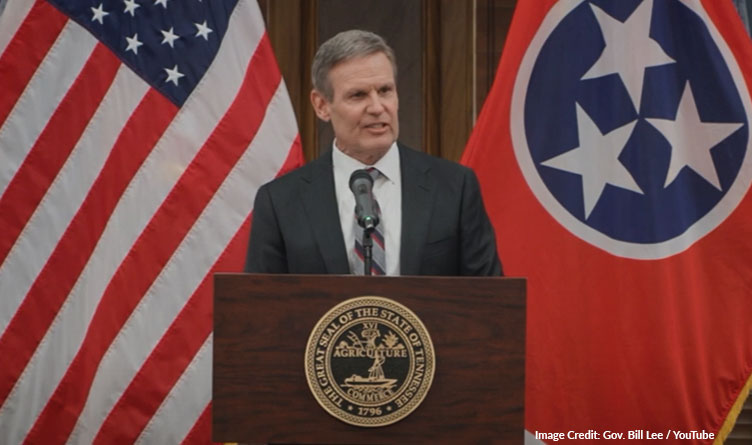Image Credit: Gov. Bill Lee / YouTube
The Center Square [By Jon Styf] –
Tennessee Gov. Bill Lee unveiled long-awaited legislation Thursday to create a new public school funding formula.
The formula, called the Tennessee Investment in Student Achievement (TISA), is a student-based funding formula and would replace the Basic Education Program (BEP) school district-based funding plan.
Lee and Department of Education Commissioner Penny Schwinn said school districts would receive more funding than they currently receive if enrollment in a public school remains the same, starting in the 2023-24 school year.
“Our goal has been to take what has been a cumbersome and outdated BEP formula and create a model that supports, in a transparent way, students in our state,” Lee said.
The governor said the state would add $1 billion to funding TISA and, in total between state and local funds, there would be $9 billion in public education funding, starting in the 2024 fiscal year.
The additional funding would not be placed into the BEP for next school year, however. Lee has proposed using the funds next fiscal year for career and technical education improvements in all high schools and middle schools ($500 million), moving 14 public schools out of flood plains ($200 million) and grants ($50 million).
If $1 billion were added to the BEP formula for next fiscal year, about 25% of school districts would have to raise local taxes in order to meet the local funding match requirement in the formula.
“We need to invest more in our public schools in our state,” Lee said. “But we don’t need to invest in a bulk, out-of-date funding formula. The BEP doesn’t deserve $1 billion put into it, but our students do deserve a $1 billion increase in public education funding.”
The new formula would set a base of funding that goes from the state to a district for each student and includes weights, which are factors for additional funding for each student.
Of the $9 billion proposed to head into the formula in fiscal 2024, $6.6 billion would be distributed as base funding that could be used for staffing and facilities.
The proposal would ask the state to pay 70% of the base and weights funding with 30% coming from local governments. Local governments would not be required to increase funding for the next four years.
“In fiscal year [2027], four years from now, that increase in dollar amount is approximately the same that districts would see under the BEP,” Schwinn said. “So no additional from what they normally would do.”
*** Click Here to Support Conservative Journalism in Tennessee. We can’t bring you stories like this without your support!***
Starting in 2023-24, an additional $1.8 billion would be distributed based on the weights, which include whether a district the student attends has a concentration of poverty, if it is required for charter school facilities, if it is a rural district or if the student has a learning disability that requires extra attention.
“The admin waited until the 11th hour to reveal the ed plan for a reason,” tweeted Sen. Heidi Campbell, D-Nashville. “On its own the weighted per-child formula is a pretty good idea. The problem is that it’s being done in conjunction with privatizing our public school system.”
Schwinn said economically disadvantaged students, about one-third of the students in the state, would receive a 25% bump in their student-based funding from the base. If a student lives in an area of concentrated poverty, as two-thirds of students in Tennessee, they would receive a 5% bump in their base funding.
A student can be eligible for multiple weights added to their base funding.
Starting in 2023-24, $376 million will be distributed in direct funding for programs such as kindergarten to third-grade literacy programs ($145 million), career and technical education ($210 million), post-secondary assessments ($13 million) and literacy tutoring for fourth-graders ($8 million).
“Today’s announcement is welcome news for Tennessee families,” said Tori Venable, Tennessee director of Americans for Prosperity. “Shifting the focus to students and better utilizing tax dollars is in the best interest of everyone in the Volunteer State. We look forward to working with the legislature to pass TISA to ensure all our students are on a path to success.”

About the Author: Jon Styf, The Center Square Staff Reporter – Jon Styf is an award-winning editor and reporter who has worked in Illinois, Texas, Wisconsin, Florida and Michigan in local newsrooms over the past 20 years, working for Shaw Media, Hearst and several other companies. Follow Jon on Twitter @JonStyf.




